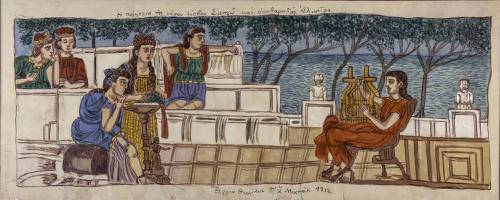
FAQ About Sappho

Who was Sappho?
Sappho was an ancient Greek poetess from the island of Lesbos, who lived around 630 to 570 BC. She is renowned for her lyric poetry, which primarily explores themes of love and personal emotion. Her work was highly influential in antiquity and she is often considered one of the greatest lyric poets.

Why is Sappho important in literature?
Sappho is important in literature because her poetry has deeply influenced Western literary tradition, particularly in the realms of personal lyric poetry and the development of themes of love and desire. Her unique voice and exploration of personal feelings have inspired countless poets and writers throughout history.

What themes are common in Sappho's poetry?
Common themes in Sappho's poetry include love, passion, and longing. She often explored personal and intimate emotions, as well as the relationships between women. Her works are distinguished by their emotional depth and expressiveness.

How much of Sappho's poetry has survived?
Only fragments of Sappho's poetry have survived to the present day. Various ancient sources, including quotations by other authors and papyrus finds, have preserved pieces of her work. Complete poems are extremely rare, with "Ode to Aphrodite" being one of the few examples.

What is the "Ode to Aphrodite" about?
The "Ode to Aphrodite" is one of the few complete poems by Sappho that has survived. It is a prayer to the goddess Aphrodite, asking for aid in matters of the heart, reflecting Sappho's themes of love and personal expression.

Where was Sappho from?
Sappho was from the island of Lesbos, located in the northeastern Aegean Sea. This region's culture and social dynamics heavily influenced her poetry.

Why is Sappho considered a pioneer in feminist thought?
Sappho is considered a pioneer in feminist thought due to her focus on women's experiences and personal emotions in a predominantly male literary tradition. Her work has been interpreted as empowering and validating female voices, influencing later feminist literature.

What is known about Sappho's personal life?
Very little is known about Sappho's personal life, and much of what is assumed comes from later historical interpretations. She probably lived during the 7th century BC, and historical accounts suggest she may have hailed from a wealthy family on Lesbos.

What did Sappho's contemporaries think of her work?
Sappho's contemporaries regarded her highly. Ancient sources often refer to her with great admiration, and she was sometimes called the "Tenth Muse." Though some male authors criticized her, her influence and reputation remained substantial in classical antiquity.

How did Sappho's poetry influence later writers?
Sappho's poetry influenced later writers by providing a model of lyrical exploration of personal themes. Poets such as Catullus and Horace admired her work, and her style and thematic focus can be seen in various later romantic and feminist poetry movements.

What is the significance of the island of Lesbos in Sappho's work?
The island of Lesbos, where Sappho was born, is significant not only as her home but also as a cultural center for poetry and intellectual activity during her time. The term "Lesbian," originally referring to inhabitants of Lesbos, became associated with female homoerotic love, partly because of Sappho's depictions of such relationships.

What challenges exist in studying Sappho's poetry today?
The main challenges in studying Sappho's poetry today include the fragmentary nature of her remaining works and the lack of definitive historical context. Scholars rely on piecing together fragments and interpreting them with limited references to create authentic understandings of her work.

Was Sappho's work formally preserved in ancient times?
Sappho's work was initially compiled into nine books by scholars in the library of Alexandria. However, these volumes have not survived through history, with most of what we know coming from citations and later discoveries of papyri.

How has modern scholarship approached Sappho's work?
Modern scholarship approaches Sappho's work by analyzing the existing fragments alongside historical, cultural, and linguistic contexts. Scholars employ methodologies across literary criticism, archaeology, and gender studies to deepen understanding and appreciation for her poetry.

What notable discoveries have impacted the understanding of Sappho's poetry?
Notable discoveries impacting the understanding of Sappho's poetry include findings of papyri dating back to the ancient world which contain fragments of her work. These discoveries have provided new insights into her themes and style.

What role did women play in Sappho's poetry?
Women play a central role in Sappho's poetry, often being subjects of love and admiration. Her works are some of the earliest to explore female homoerotic themes with creativity and depth, focusing on relationships, emotions, and the social milieu of women during her time.

How does Sappho's poetry reflect ancient Greek culture?
Sappho's poetry reflects ancient Greek culture through its use of lyric form, an exploration of personal emotions, and its invocation of Greek mythology. Her poetry offers insights into the social roles and expectations, particularly regarding love and women, in ancient Greece.

Why is much of Sappho's biography considered speculative?
Much of Sappho's biography is considered speculative due to the lack of contemporary documentation about her life. Most of what is known comes from later sources that may mix fact with fiction, leaving a blurred line between historical and legendary accounts.

How is Sappho's work relevant today?
Sappho's work remains relevant today for its exploration of universal themes like love and desire. Her emphasis on personal expression and women's experiences continues to resonate in contemporary discussions of gender, sexuality, and literary voice.

What impact did Sappho have on the perception of women in her era?
Sappho had a significant impact on the perception of women in her era by challenging traditional gender norms through her poetry. By focusing on women's emotions and experiences, she offered a powerful counter-narrative to the male-dominated literary tradition of ancient Greece.
